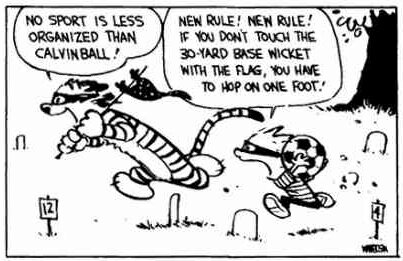2 May 2019
Calvinball is the name of a fictional sport coined by cartoonist Bill Watterston in his syndicated comic strip Calvin and Hobbes. In the strip, Calvinball is a sport where the participants make up the rules as they go along. But the word has not remained within the confines of the comic and is now being used in other contexts where the “rules” are constantly changing.
Calvin and Hobbes ran from 1985–95. The strip centers around the imagination of a small boy, Calvin, and his stuffed tiger, Hobbes, who came to life in Calvin’s imagination. Enormously popular and critically acclaimed, the comic strip is recognized as one of the greatest of the genre. Calvinball first appeared in the 5 May 1990 strip.
True to its nature, Calvinball could not be restricted by the rule of remaining within the context of the comic and has broken free. For instance, this appeared on Public Radio International on 12 May 2011 discussing the problem of piracy in the Indian Ocean:
Over the past few years, Somali pirates have posed a bigger and bigger challenge to India, disrupting its trade, capturing its merchants, attacking closer to its shores and—like a game of Calvinball—changing the unwritten rules as they go.
Financial blogger Mike Konczal used the word on 10 June 2011 in reference to monetary policy, a use that was picked up and repeated by Paul Krugman in the New York Times. Konczal wrote:
A friend pointed out that post-crisis conservative economists talking about monetary policy in general, and QE2 specifically, is like watching a game of Calvinball—they appear to be making up the rules and the specifics of how to score points in the debate on the fly.
Or there is this from an Australian gaming blog from 20 December 2017, discussing how patches (updates) to video games alter the play:
Patches are one of the best parts of gaming; you get to play Calvinball in real time, over the span of years.
Use of Calvinball outside the context of the comic strip seems to have gained currency around 2010, some fifteen years after the strip had ended. The earliest I’ve been able to find is a discussion of socialism and the Democratic Party from 2010. It was made as a comment to a blog post by conservative commentator Ed Morrissey. It was captured by Brigham Young University’s News On the Web (NOW) corpus. The original blog post is archived and still available, but the comments seem to have been deleted:
Also, I can not and will not recommend the original form of socialism because it is unwise in the extreme. To put the whole matter very simply, it would be like going to a highly-charged political protest and trying to organize a baseball game out of participants chosen from the two sides. One would be lucky to have a civil game of Calvinball, let alone anything resembling official baseball.
Earlier uses almost certainly exist. I have found many, but these are references to the comic strip and don’t use the term in other contexts, such as this from a mediation on the hula hoop and the death of its creator, Richard Knerr, in the New York Times from 20 January 2008:
What gets lost, perhaps, is childhood. Dr. Hall expressed a preference for the anarchic sense of play that the cartoonist Bill Watterson depicted in “Calvin and Hobbes” and the crazed game of Calvinball: primitive, wild and playful.
Sources:
Ingber, Hanna. “India steps up the fight against piracy.” PRI.com. 12 May 2011.
Konczal, Mike. “Rajan Plays Calvinball on Monetary Policy.” Rortybomb. 10 June 2011.
Krugman, Paul. “Monetary Calvinball.” New York Times. 10 June 2011.
Morrissey, Ed. “Gallup: Majority Of Democrats Have Positive Image Of Socialism.” Hot Air. 5 February 2010.
Schwartz, John. “The Joy of Silly.” New York Times. 20 January 2008.
Van Allen, Eric. “The Weirdest Patch Notes Of 2017.” Kotaku.com.au. 20 December 2017.
Watterston, Bill. Calvin and Hobbes. Andrews McMeel Publishing. 5 May 1990.

